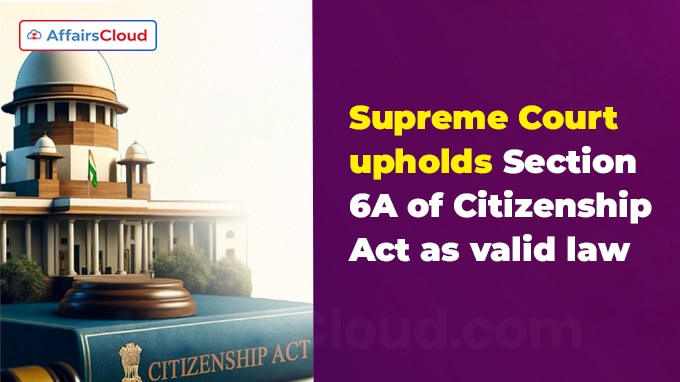 The Supreme Court of India (SCI) upheld the constitutionality of Section 6A of the Citizenship Act, 1955, with a majority of 4:1 in a 5-judge bench. As per it, Section 6A does not violate Articles 6 and 7 of the Constitution, which pertain to citizenship rights established at the Constitution’s commencement in 1950.
The Supreme Court of India (SCI) upheld the constitutionality of Section 6A of the Citizenship Act, 1955, with a majority of 4:1 in a 5-judge bench. As per it, Section 6A does not violate Articles 6 and 7 of the Constitution, which pertain to citizenship rights established at the Constitution’s commencement in 1950.
- Instead, Section 6A addresses migrants from erstwhile East Pakistan (Present Bangladesh), specifically those who entered Assam between January 1, 1966, and March 24, 1971.
- The majority judges, which includes Chief Justice of India (CJI) Dhananjaya Yeshwant (DY) Chandrachud and Justices Surya Kant, M.M. Sundresh, and Manoj Misra, upheld Section 6A of the Citizenship Act, 1955. Justice Jamshed Burjor (JB) Pardiwala dissented in the verdict.
Note:
i.Article 6 states that Rights of citizenship of certain persons who have migrated to India from Pakistan
ii.Article 7 states Rights of citizenship of certain migrants to Pakistan
Why is the cut-off date March 24, 1971, chosen?
The cut-off date of March 24, 1971, is significant as it marks the start of military operations in East Pakistan, leading to mass migration into Assam. This date is closely associated with the Bangladesh Liberation War.
Key Points:
i.The Court recognized that Assam has a special demographic and political situation. The large number of migrants affected Assam more than other states, which is why it needs specific laws like Section 6A.
ii.The Court ruled that changes in demographics do not violate cultural rights protected under Article 29(1). It highlighted that different cultures can coexist peacefully in Indian society.
iii.The ruling confirmed that Section 6A supports the broader goals of unity and social justice in India. It dismissed claims that the law encourages illegal immigration or outside threats.
What is Section 6A of the Citizenship Act?
Section 6A was introduced as part of the Citizenship (Amendment) Act/CAA in 1985 following the Assam Accord, which aimed to resolve tensions over illegal immigration from Bangladesh. Here are its key provisions:
i.It grants citizenship to individuals who entered Assam before January 1, 1966. Those who arrived between January 1, 1966, and March 24, 1971, can apply for citizenship after ten years of residence in Assam.
ii.Individuals entering Assam after March 25, 1971, are classified as illegal migrants and are subject to deportation under legal procedures.
iii.Citizens recognized under Section 6A enjoy all rights and obligations similar to Indian citizens but may face restrictions on voting for a specified period if they entered during the defined timeframe.
Why was Section 6A challenged?
Petitioners, including the Non-Governmental Organization (NGO) Assam Public Works (APW) and the Assam Sanmilita Mahasangha/ASM (Lead Petitioner), argued that the different cut-off date for citizenship in Assam is discriminatory and violates Article 14 of the Constitution of India, which guarantees equality.
Key Concerns raised by them:
i.They raised concerns that this provision contradicts Articles 6 and 7, which govern citizenship for migration related to the Partition.
- Article 6 grants citizenship to those who migrated from Pakistan before July 19, 1948, while Article 7 denies it to those who moved to Pakistan after March 1, 1947.
ii.The petitioners also claimed that Section 6A has led to a noticeable shift in Assam’s demographic balance, threatening the cultural and linguistic rights of the region’s indigenous population as protected under Article 29.
iii.They argued that this situation places an obligation on the Union government to safeguard the state under Article 355.
But SCI upheld the constitutionality of Section 6A, with abovementioned verdict.
Addition of Section 6B:
In addition to Section 6A, Section 6B was added by the CAA in 2019. This section establishes another specific provision within the Citizenship Act. It sets December 31, 2014, as the cut-off date for citizenship eligibility for Hindu, Christian, Sikh, Parsi, Buddhist, and Jain migrants from the Muslim-majority countries of Pakistan, Bangladesh, and Afghanistan.
- It specifically applies to non-Muslim migrants from the aforementioned countries.
Recent Related News:
i.The Ministry of Women and Child Development (MWCD), Government of India (GoI) has reconstituted the Executive Council (EC) and General Body (GB) of the National Institute of Public Cooperation and Child Development (NIPCCD) after more than 50 years.
ii.The Muslim Women’s Rights Day also known as ‘Muslim Mahila Adhikar Divas’ is annually observed across India on August 1 to commemorate the enactment of Muslim Women (Protection of Rights on Marriage) Act, 2019 which prohibits the practice of Triple Talaq in India.
About Supreme Court of India (SCI):
SCI established on January 26, 1950, is the highest judicial authority under the Indian Constitution, as mandated by Article 124.
Secretary General– Atul Madhukar Kurhekar
Headquarters– New Delhi, Delhi




